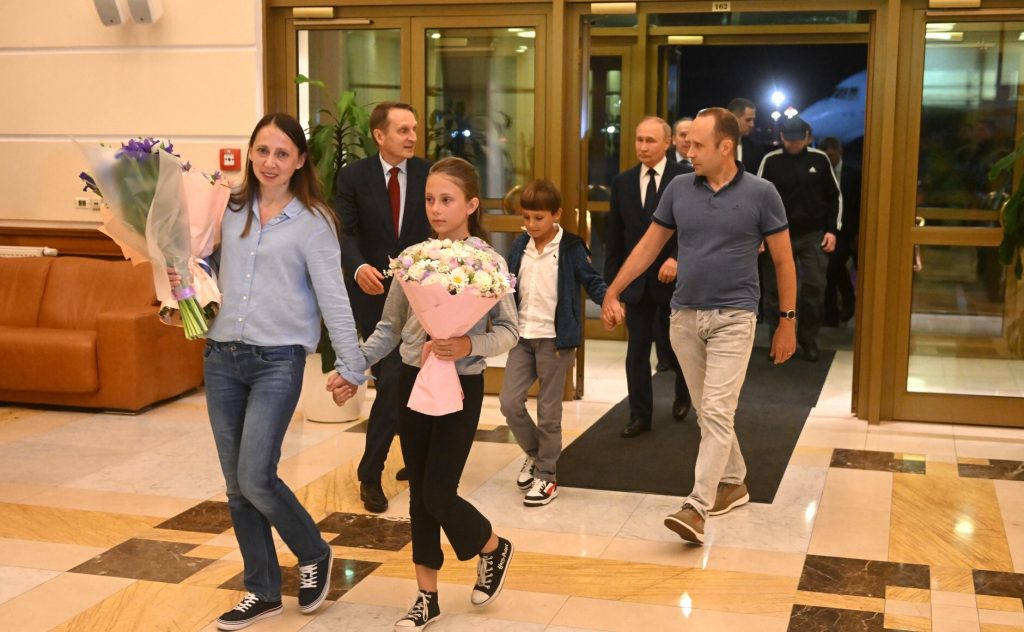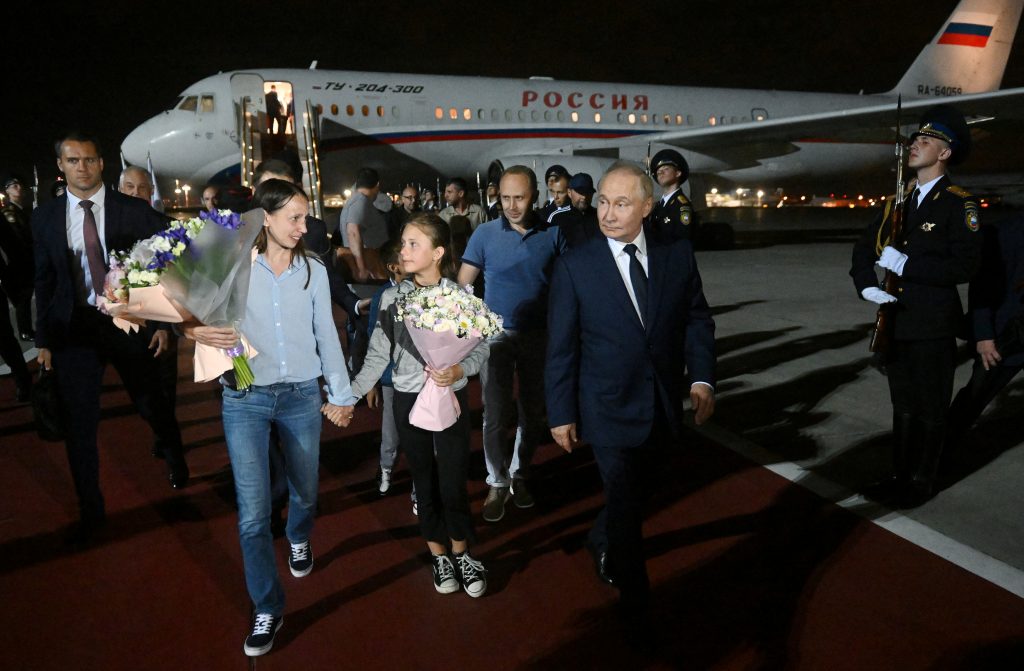“Ludwig” and “Maria” had suffered an abrupt end to their clandestine careers, arrested just after finishing breakfast in their suburban home and outed as deep-cover spies for Moscow. But as they flew in a Bombardier jet to freedom as part of an epic prisoner swap last month, they had more familial concerns in mind: How to break it to the kids? Please, they’d quietly pleaded with their Slovenian escorts, don’t address us by our real names. They hadn’t yet told their son and daughter, touring the cockpit, that they were Russian.
The two officers from Directorate S, the so-called “illegals department” of Russia’s SVR foreign intelligence agency, had spent more than a decade building fake identities. Their children, 9-year-old Daniel and 11-year-old Sophie, knew their mom and dad as Argentine citizens named Ludwig Gisch and Maria Mayer Muños. What they didn’t know is that their family was a carefully constructed lie .
The couple’s real names are Artem and Anna Dultsev. After a marriage likely arranged by Directorate S, they had been sent to Argentina, where Daniel and Sophie were born. When Moscow moved the couple from Buenos Aires to a sleepy suburb in the capital of Slovenia, the children enrolled in an international school, completing the facade of a normal middle-class family.
Even after they were caught and jailed for espionage, the couple still hadn’t told their children that Spanish—the family’s language—was a second tongue, learned to fluency for a secret assignment meant to last until the siblings came of age and could hopefully be recruited to follow in their footsteps.
As Sophie and Daniel returned from the cockpit, they chatted with the bespectacled man who had overseen their care during their parents’ 1½ years of imprisonment. Unbeknown to them, he was the head of Slovenia’s spy agency, which had helped the U.S. capture and trade their parents. Also on board: a CIA officer who had brought a bottle of bourbon to drink with the Slovenes once the trade was complete.
The plane descended toward the exchange point in Ankara and the mood darkened as the parents fell into an earnest discussion about the culture shock awaiting their family in Moscow. It was only after they had been escorted onto a Russian plane by masked officers that the parents began the tough job of coming clean to their children. “The real hell for them was about to begin, when they returned,” said one person present.
The Wall Street Journal has unearthed new details about the Dultsev family’s decadelong mission and the sacrifices it entailed. A crucial piece of the story is the importance placed by Russian President Vladimir Putin on the work of illegal spies, so called because they operate without diplomatic immunity.

MOSCOW, RUSSIA – AUGUST 01: Russian President Vladimir Putin welcomes prisoners released following the swap deal at Vnukovo International Airport in Moscow, Russia on August 01, 2024. Eight Russian citizens, who were detained or imprisoned in a number of countries, have returned home following a major prisoner swap operation led by Turkiye. Kremlin Press Office / Handout / AnadoluNo Use USA No use UK No use Canada No use France No use Japan No use Italy No use Australia No use Spain No use Belgium No use Korea No use South Africa No use Hong Kong No use New Zealand No use Turkey
Putin has spent decades restoring prestige to a clandestine program that harks back to the glory days of Soviet spycraft, when top illegal agents like Rudolf Abel, later depicted in Steven Spielberg’s “Bridge of Spies,” were celebrated in commemorative stamps. The future president’s first TV appearance, according to state-controlled media, was a 1991 interview in which he admitted he’d been in the KGB, then re-enacted the final scene of the most famous Soviet spy movie about a sleeper agent named Stierlitz—with Putin cast as the spy.
The movie, “Seventeen Moments of Spring,” entrenched the notion that the Communist bloc had a secret weapon: an unseen army of sleeper agents embedded into elite circles and ordinary society, who had already helped Moscow win World War II and steal the technology behind the atomic bomb.
“Not everyone can give up their current life, give up their loved ones, their relatives and leave the country for many, many years, dedicate their lives to serving the Fatherland,” Putin told state television in 2017. “Only the chosen ones can do that.”
In confidential meetings with the Central Intelligence Agency, Putin’s top spy chiefs have extolled the exploits of Soviet-era illegals as if their successes were recent, or relevant. Senior CIA officers who once worked in Moscow say they have seen little evidence in recent years that the program has generated results worthy of its huge investment—though they acknowledge its role in the mythology of Russian spy lore.
Building a family around a sleeper agent comes with a heavy price—presenting ethical quandaries so profound that Western intelligence services rarely go that route.
Officers are asked to live for years and sometimes decades inside a thickening web of lies. They usually don’t marry for love but are selected for unions by Directorate S. They might be deployed as professional philanderers to seduce a target. Their children grow up in nations they are suddenly expelled from, their identity and friendships shattered. In a rare admission, Vladimir Kryuchkov, a former head of the KGB, conceded in a 1996 memoir that the families of illegals often suffered “not just a generation gap but an irreconcilable hatred.”
Now free and giving TV interviews in Moscow, the Dultsevs have been transformed from ordinary Argentine immigrants into two of Russia’s most famous spies. Their admirers include Putin himself, who was waiting for them at the airport with a bouquet of flowers. When they descended the stairs from their jet, the president embraced them both, tenderly kissing a weeping Anna Dultseva on her cheek then shoulder. Their employer, the SVR, didn’t reply to detailed questions or requests for an interview.
“We told the children that we were Russian, that they were Russian, that we were the Dultsevs,” Anna told the nightly news on state TV’s Russia One, struggling to find words in her native tongue.
“The most important thing for us is family, and this supports us,” her husband interjected. “And family is the country.”
Taking cover
Putin’s covert rebuilding of the illegals program became visible in 2008, with the arrest of Herman Simm, an Estonian defense ministry security chief, who had become Russia’s top spy inside the North Atlantic Treaty Organization. Simm’s handler was a man who claimed to be a Portuguese national named Antonio de Jesus Amurett Graf, but was in fact a Russian deep-cover agent named Sergey Yakovlev.
Surveilling Simm and Yakovlev gave Western spies new insights into how the Russian illegals’ tactics, or tradecraft, had changed.
Before each meeting, Simm sent a numerical code from a public pay phone to Yakovlev’s pager. The code was a combination of his identification number, 242, and the number 55, which signaled that the agreed meeting could take place. Simm was instructed to enter the number 77 if there was a problem.
In 2010, the Federal Bureau of Investigation arrested 10 Russian illegals living in the U.S., after a secret decadelong surveillance program dubbed Operation Ghost Stories.
The case harvested another treasure trove of intelligence: FBI agents bugged the spies’ homes, followed them around the country and ultimately cracked their secret communications network.
But the Obama administration, seeking a reset with Russia, played down its significance, framing it as a post-Soviet hangover rather than evidence of a reinvigorated illegals program.
When Russia’s spies returned to Moscow in a prisoner swap shortly after their arrest, Putin met them and said they sang patriotic songs, including “From Where the Motherland Begins,” which appeared in another Soviet spy movie, “The Shield and the Sword.”
Two of the illegals, Andrey Bezrukov and Elena Vavilova, had stolen the identities of dead Canadians, Donald Heathfield and Tracey Lee Ann Foley. The spies had adolescent children, Alex and Tim, who were born in Canada, before moving to the U.S.
The brothers said they had no idea they were Russians with the surname Vavilov until they were put on a plane to Moscow to start an entirely new life.
Neither wanted to stay in Russia long. Tim moved to Asia and Alex fought a nine-year legal battle to retrieve his Canadian citizenship, returning in 2019 to start a job in finance.
“Yes they can’t come here and that’s their punishment for what they have done,” he said of his parents, in an interview with the Canadian public broadcaster. “But why should I suffer?”

Russian President Vladimir Putin welcomes Russian nationals, including Artyom Dultsev, Anna Dultseva and their children, following a prisoner exchange between Russia with Western countries, during a ceremony at Vnukovo International Airport in Moscow, Russia August 1, 2024. Sputnik/Mikhail Voskresensky/Pool via REUTERS ATTENTION EDITORS – THIS IMAGE WAS PROVIDED BY A THIRD PARTY.
In the case of the Dultsevs, Putin was closely monitoring their work as they traveled widely across the EU, according to U.S. and European intelligence officials. Artem founded an IT firm that sold domain names and cloud hosting. Anna opened an art gallery, providing cover as she traveled for exhibitions across Europe and discreetly moved money. They used their anonymity to meet and pay sources and identify and cultivate new assets that could be handed to SVR officers working under diplomatic cover at Russian embassies. One officer, working as a military attaché, was later deported from Slovenia.
The couple told their children nothing about their mission or their true identity, Slovenian officials said, but did mention that one day they may have to be separated because of their work. The siblings attended school in a communist-era building surrounded by trees. In one picture on the school website, Sophie is seen sitting under a linden tree with her reading book, looking at the camera.
On Dec. 5, 2022, just after the children had been dropped off at school, brown-clad Slovenian special forces approached the family’s pastel-colored house, climbed the gate and broke through the shutters on the windows. The authorities removed documents, computers, communication devices, and hundreds of thousands of euros found in a special compartment of their refrigerator. Artem and Anna were taken away.
The children were housed with a foster family. They were told their parents had some problems with Slovenian residence documents and would have to spend some time in police detention.
Joško Kadivnik, the Slovene spy chief, was personally monitoring Sophie and Daniel’s welfare to ensure they were affected as little as possible. They were allowed to video call daily with their parents, held in separate cells, who would help them with schoolwork. Once a week they would visit them in person and chat in Spanish about school and what they’d been doing with their friends. The siblings learned Slovene to near-fluency from their foster family and classmates. Later, they learned some Russian, unaware that they were picking up their mother tongue.
In the days after the arrest, senior Russian security officials had confirmed to Slovenia that the couple were SVR officers and asked them to be immediately released. When Slovenia refused, Russian officials requested they be treated differently from other prisoners. Western allies advised them they should be held in good conditions and given the chance to refuse extradition to Russia. “It’s like a Geneva convention among spies,” said Vojko Volk, Slovenia’s national security adviser.
The two spies swiftly became bartering chips in some of the most complex prisoner talks ever conducted. The ultimate trade, set for Aug. 1 on a cordoned-off runway in Ankara, encompassed 24 adults held in seven countries, including former U.S. Marine Paul Whelan, Journal reporter Evan Gershkovich and Vadim Krasikov, an officer of the Russian Federal Security Service, or FSB, sentenced to life imprisonment in Germany for murder.
Also stepping off a plane that day were two children wearing hoodies and Harry Potter sneakers. Turkish officers escorted Daniel and Sophie across the runway onto another jet bound for Moscow by masked men from the Russian security services. Aboard that five-hour flight, Anna explained in Spanish that they had been involved in a secret mission for Russia.
“She distracted Sophie, who had toys, and was watching something on the screen,” Artem later told Russian TV. “I just noticed her emotions, then she started to cry a little.”
“I also told Daniel,” he added. “He took it more calmly, but very positively.”
When they arrived at Vnukovo airport, Putin pinched Sophie’s cheek, as she stared forward impassively.
“Buenas Noches,” the president said.
“All of you will be nominated to receive for state awards,” he later told the parents and the other spies gathered in the airport with them. “You and I will meet again sometime later and we will talk about your future.”
Previous illegals and celebrated agents became lawmakers, corporate executives and media personalities. Russian agents Anna Chapman and Maria Butina have hosted talk news shows, while Cold War-era spy Kim Philby lectured at KGB headquarters with the rank of colonel.
Four days after the prisoner exchange, the Dultsev family appeared on the nightly news, answering questions in a garden at the SVR’s headquarters on the outskirts of Moscow. Anna Dultsev said that her family would continue to “serve Russia.”
The reporter gave Sophie a doll and handed Daniel a remote-controlled toy rocket, adding that the children have been practicing their Russian by reading the sign at a monument to a famous fictional spy.
“Just remember your duty,” Daniel reads, from the base of the statue.
The name of the spy? Stierlitz.
Write to Joe Parkinson at joe.parkinson@wsj.com and Drew Hinshaw at drew.hinshaw@wsj.com



